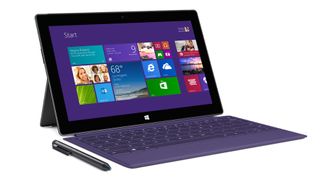Microsoft plans to launch Surface 2 with LTE early next year
Stepping up the Surface

A version of the just-announced Surface 2, which stands as the next-gen Surface RT, will launch with LTE support early next year.
The news of an LTE-lapping Surface 2 came from Microsoft Vice President of Surface Panos Panay during a post-event Reddit Ask Me Anything session.
"Why was LTE not included on neither Surface nor Surface Pro?" posed one participant.
"Great question," Panay responded. "We didn't talk about it today, but Surface 2 will be launching an awesome LTE SKU early next year!
"Nice catch on your part, no one else has asked this question...... what better way to tell people than through Reddit!!"
Whoa, excitement.
Surface 2, too?
While Panay probably chose his words carefully, it's not completely clear whether Panay was referring to the Surface 2, which runs Windows 8.1 RT, or the more better specced Surface Pro 2, or both.
Are you a pro? Subscribe to our newsletter
Sign up to the TechRadar Pro newsletter to get all the top news, opinion, features and guidance your business needs to succeed!
Redditors asked for clarification, but Panay nor other Surface Team members have responded.
Both tablets were announced today as follow-ups to the Surface RT and Surface Pro, and neither supports LTE.
We asked Microsoft to clear things up and were told the company has nothing more to add beyond "what was shared in the Reddit chat."
If LTE does indeed come to the lower-level Surface 2, it'd be a nice boon for customers who've been clamoring for high-speed connectivity.
Update: Microsoft's LTE ambitions may be even bigger than Panay let on. According to Mary Jo Foley at ZDNet, Microsoft might be considering bundling Windows Phone with Surface. It would serve as a solution to areas where built-in wireless support for the Surface is problematic.
Michelle was previously a news editor at TechRadar, leading consumer tech news and reviews. Michelle is now a Content Strategist at Facebook. A versatile, highly effective content writer and skilled editor with a keen eye for detail, Michelle is a collaborative problem solver and covered everything from smartwatches and microprocessors to VR and self-driving cars.

